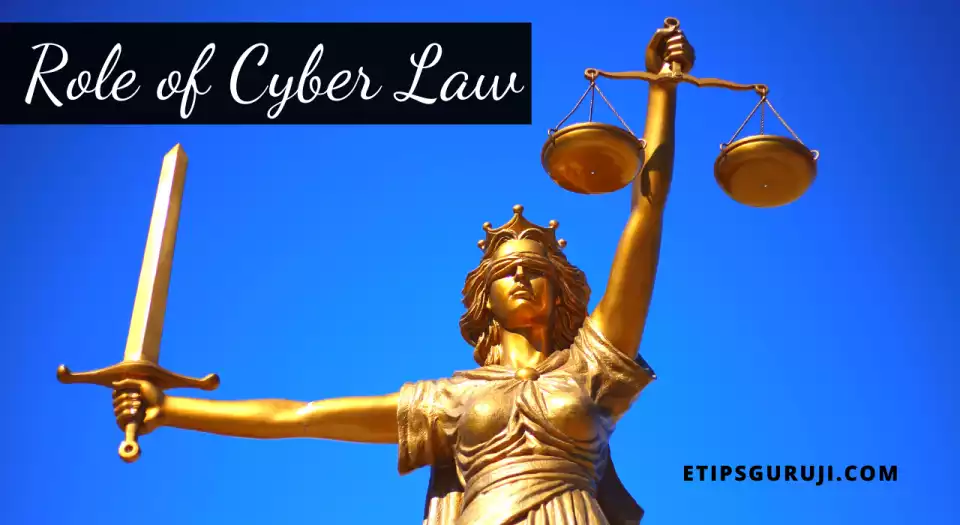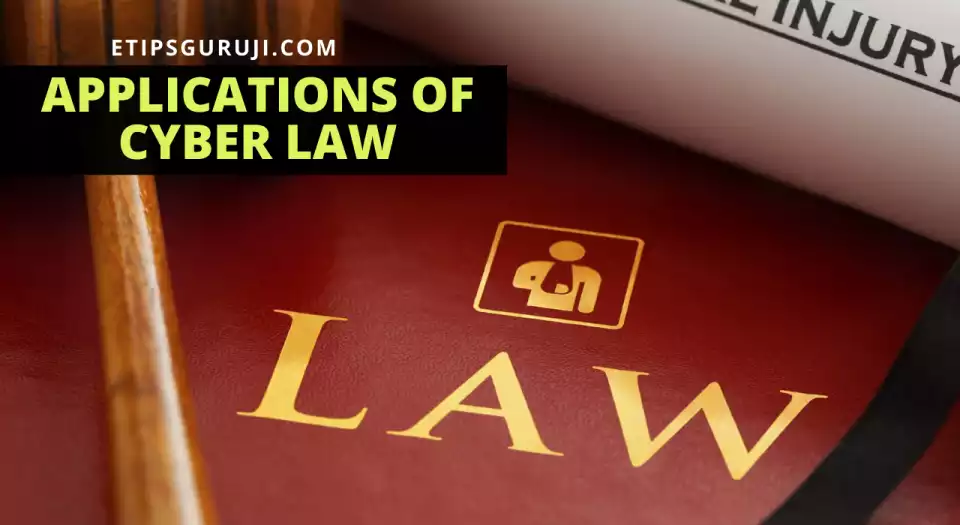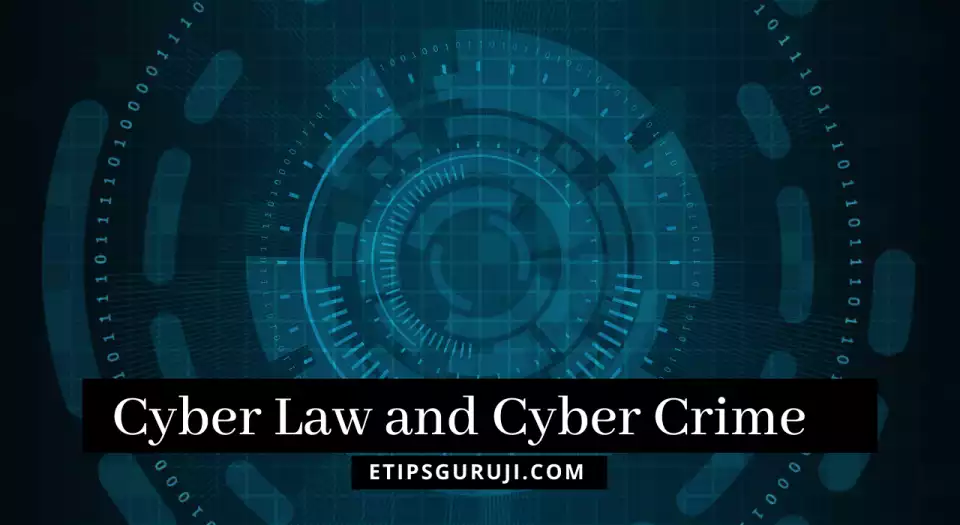Cyber Law: Basic Role, Need, Application, & Its Advantages

In this post, you will get all the details related to what is Cyber Law and its importance, meaning, applications, role, need, and advantages along with some frequently asked questions.
In addition, we are also going to discuss one of the main branches of forensic science i.e. cyber law or “cybercrime”.
What is Cyber Law? (Cyber Law Definition)
Cyber Law is also known as a cybercrime law that deals with the internet and cyberspace crime which is a part of the overall law system.
Cyber Law is basically a broader term that provides freedom of expression, access to and usage of the Internet, and online privacy to the users.
In general, we can call cyberlaw the “Law of the Internet”. While talking about its history, the first cyber law act was named the “Computer Fraud and Abuse Act” which was passed in 1986.
What is the Role of Cyber Law?

The most important role of cyberlaw is that it helps in defining or representing the rules of cyber society. It also helps to enter into legally enforceable digital contracts which helps to maintain cyber properties.
And this is why it is important for driving any online business. Moreover, it helps in providing legal recognization of electronic records such as electronic documents and digital signatures.
Why do we Need Cyber Laws?
The importance of Cyber Law is that In the world of growing electronic communication, the words “cyber laws” and “cyber crimes” are becoming more complex.
The main aim of the internet was to make human life easier and to provide a speed up communication. But as the number of people on the internet increases day by day, so does crime.
Therefore, in order to protect users’ rights, property rights, copyright, data protection, etc. we need some strict laws. That is why we need Cyber Laws.
Applications of Cyber Law

There are basically two types of applications of cyberlaw which are listed below:
- Digital Transaction
- Activities on the Internet
Digital Transaction
Digital transactions are those online transactions that take place between two or more participants.
In these types of transactions, cash doesn’t require. For example, if you signed a contract online rather than in printed paper, or you make a payment through your debit or credit card, then we can call it a digital transaction.
In both cases, by going digital, makes the transaction faster, more convenient, and easier. So, any fraud in digital transition is held in the cyber law.
Activities on the Internet
We do a lot of activities on the internet like shopping online, downloading, file sharing, social networking, banking and finance, online gaming and entertainment, buying or making a reservation for travel and email, etc.
Advantages of Cyber Laws
These are some advantages of cyberlaw which are listed below:
- Secured E-commerce for Setting up Online Business
- Digital Certificate for securing the site
- Blocking unwanted content from the Internet
- Proper monitoring of traffic
- Security Against common frauds
- Born of new Security Agencies like Cyber Cell
- Software as well as Hardware security
- Proficient use of E-Forms as prescribed
- Emails are a legal form of communication and it is approved in a court of law.
Mostly, the above points are the Major advantages of Cyber Law in India.
Disadvantages of Cyber Law
These are the disadvantages of Cyber Law.
- Internet-based video-streaming services aren’t yet covered by this cyber regulation.
- Fake IDs and leads cannot be tracked by online media outlets at this time.
Cyber Law and Cybercrime

Cybercrime is a crime committed on the internet, using the internet, and by means of the internet. Computer crime is a general term that embraces such crimes as phishing scams, identity theft scams, denial of service attacks, invasion of privacy, credit card fraud, cyberterrorism, and so on.
Top 5 Cyber Crimes
Here is the top five cybercrimes that are common in the world.
Phishing Scams
The term “Phishing” means a fraudulent act of attempting to acquire information such as user names, passwords, home addresses, credit card details, or even social security numbers by masquerading as a trustworthy entity in an electronic communication.
Phishing is typically carried out by email spoofing or instant messaging and it can open direct users to enter their financial or confidential details on a fake website.
Identity Theft Scams
Cybercrooks can do all kinds of things with a personal identity which includes making purchases in your name, easy access to your credit card, stealing users’ hard-earned savings, leaking banking account information, and more. These cybercrooks use this information for criminal purposes.
To avoid these you should not disclose too much information on social media and any other websites.
Denial of Service Attack
Denial of Service attack or DOS is a cyberattack that temporarily slows down the function of web applications rather than steals information.
The attackers do this attack for enormous traffic using specialized bots so that legitimate users cannot easily access the website.
Cyberstalking
Cyberstalking means the use of electronic communications which includes the internet to stalk, kill, injure, harass, or intimidate a person or group of people by sending them threatening emails.
Invasion of privacy
The invasion of privacy means the act of interference in an individual personal life. It includes hacking their PC, reading emails, or monitoring online activities.
Many of these crimes are punishable under the law. If you find yourself with any kind of threat, you can contact the police and also file a report against the offender.
Advantages of Cybercrime Law
- It’s a good thing to have if you’re in business.
- Personal information should be safeguarded.
- Ensures your safety while working.
- Additionally, productivity is safeguarded as a result of this measure.
- In many cases, it may be used to automate a variety of processes.
- Improve the way data and information are organized.
- For example, vital files and data may be kept in the cloud.
People Also Read:
- Flash Memory – How it Works, Types, Applications, Advantages
- Server- Types, Purpose, Advantages & Disadvantages
- 5G Technology – How it Works, Features, Advantages & Disadvantages
Here our topic Cyber Law ends. Now, we have listed down some frequently asked questions that users might search on Google.
General FAQ
When was cyber law introduced in India?
Cyberlaw firstly introduced in India on 17 October 2000. Its primary aim is to deal with crime and electronic commerce.
What is Cyberattack?
An attack started by cyber criminals with the main aim of stealing information and disable computer networks. Cybercriminals use different methods to launch a cyberattack like malware, denial of service, ransomware, etc.
What is Cybersecurity?
Cybersecurity or computer security provides protection to the computer system and networks against the theft of any hardware, software, or electronic data.
What are the three examples of cybercrime?
Cyber harassment, stalking, credit card fraud, human trafficking, identity theft, and online libel are the few examples of cybercrimes.
Why is Cyber Law important?
Cyberlaw is important because it covers all the related aspects of all transactions and activities which require the internet and cyberspace. Every action and reaction that takes place in cyberspace has some legal aspects.
